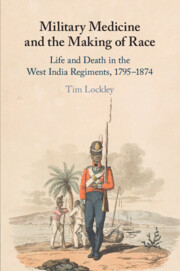Crossref Citations
This Book has been
cited by the following publications. This list is generated based on data provided by Crossref.
Prochnow, Kyle
2021.
“Saving an extraordinary expense to the nation”: African recruitment for the West India Regiments in the British Atlantic world.
Atlantic Studies,
Vol. 18,
Issue. 2,
p.
149.
Hogarth, Rana A.
2021.
Race, place, and power in the production of medical knowledge: Perspectives from the Greater Caribbean.
History Compass,
Vol. 19,
Issue. 11,
Barcia, Manuel
2022.
Into the future: A historiographical overview of Atlantic History in the twenty first century.
Atlantic Studies,
Vol. 19,
Issue. 2,
p.
181.
Seth, Suman
2023.
Race, Seasoning, and Strangeness: The Problem of Mobility in Early Modern Science and Medicine.
Global Intellectual History,
Vol. 8,
Issue. 4,
p.
448.
Willoughby, Christopher D. E.
2024.
Professors of racial medicine: imperialism and race in nineteenth-century United States medical schools.
Medical History,
Vol. 68,
Issue. 2,
p.
146.
Goff, Benjamen
2024.
Medicalizing Topography: The French Army and Mediterranean Climates, 1760–1860.
Canadian Journal of Health History,
Vol. 41,
Issue. 1,
p.
37.
Seth, Suman
2024.
“A Decided Inaptitude in His Constitution”.
Osiris,
Vol. 39,
Issue. ,
p.
95.



